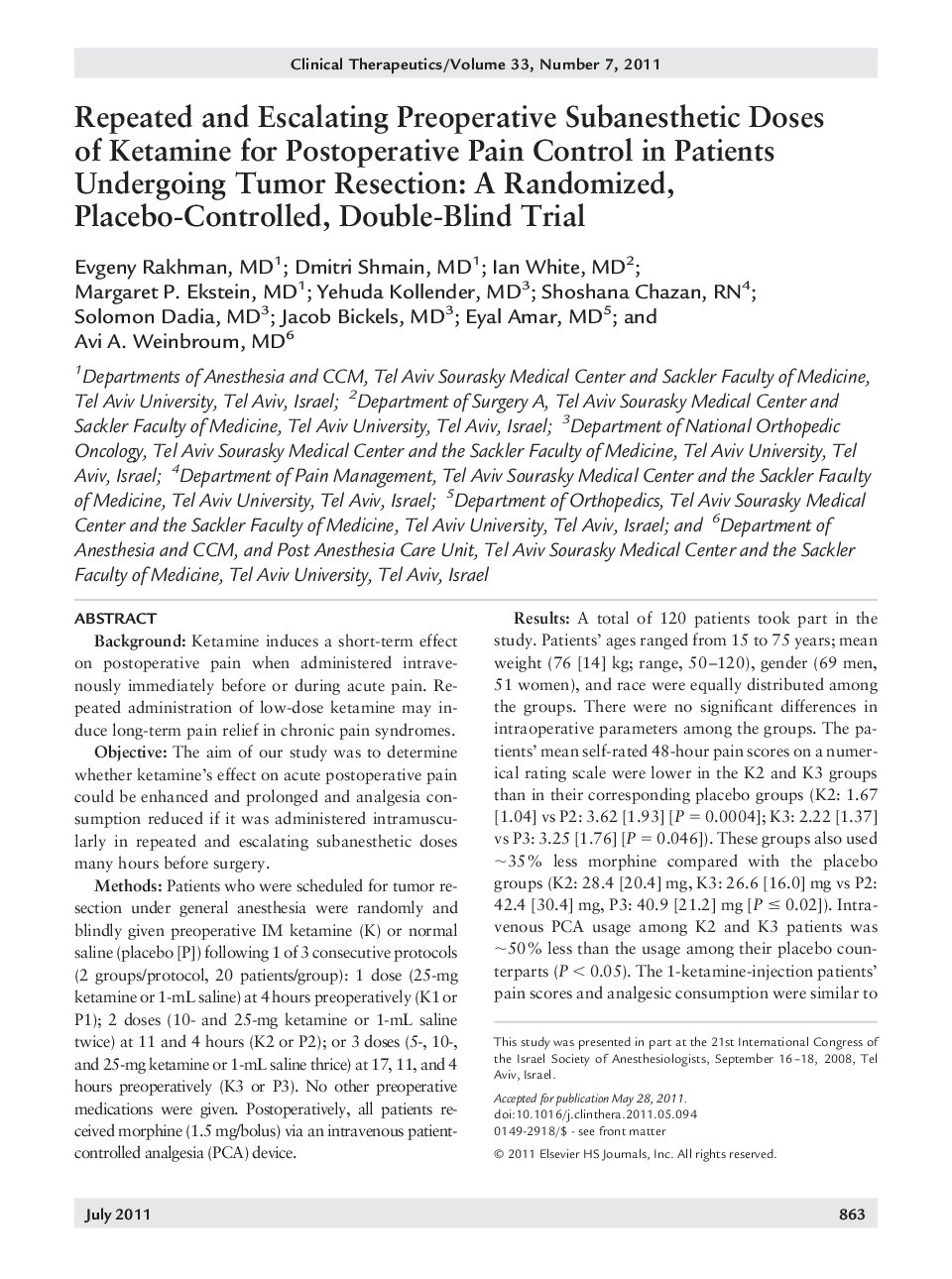| کد مقاله | کد نشریه | سال انتشار | مقاله انگلیسی | نسخه تمام متن |
|---|---|---|---|---|
| 2527487 | 1119921 | 2011 | 11 صفحه PDF | دانلود رایگان |

BackgroundKetamine induces a short-term effect on postoperative pain when administered intravenously immediately before or during acute pain. Repeated administration of low-dose ketamine may induce long-term pain relief in chronic pain syndromes.ObjectiveThe aim of our study was to determine whether ketamine's effect on acute postoperative pain could be enhanced and prolonged and analgesia consumption reduced if it was administered intramuscularly in repeated and escalating subanesthetic doses many hours before surgery.MethodsPatients who were scheduled for tumor resection under general anesthesia were randomly and blindly given preoperative IM ketamine (K) or normal saline (placebo [P]) following 1 of 3 consecutive protocols (2 groups/protocol, 20 patients/group): 1 dose (25-mg ketamine or 1-mL saline) at 4 hours preoperatively (K1 or P1); 2 doses (10- and 25-mg ketamine or 1-mL saline twice) at 11 and 4 hours (K2 or P2); or 3 doses (5-, 10-, and 25-mg ketamine or 1-mL saline thrice) at 17, 11, and 4 hours preoperatively (K3 or P3). No other preoperative medications were given. Postoperatively, all patients received morphine (1.5 mg/bolus) via an intravenous patient-controlled analgesia (PCA) device.ResultsA total of 120 patients took part in the study. Patients' ages ranged from 15 to 75 years; mean weight (76 [14] kg; range, 50–120), gender (69 men, 51 women), and race were equally distributed among the groups. There were no significant differences in intraoperative parameters among the groups. The patients' mean self-rated 48-hour pain scores on a numerical rating scale were lower in the K2 and K3 groups than in their corresponding placebo groups (K2: 1.67 [1.04] vs P2: 3.62 [1.93] [P = 0.0004]; K3: 2.22 [1.37] vs P3: 3.25 [1.76] [P = 0.046]). These groups also used ∼35% less morphine compared with the placebo groups (K2: 28.4 [20.4] mg, K3: 26.6 [16.0] mg vs P2: 42.4 [30.4] mg, P3: 40.9 [21.2] mg [P ≤ 0.02]). Intravenous PCA usage among K2 and K3 patients was ∼50% less than the usage among their placebo counterparts (P < 0.05). The 1-ketamine-injection patients' pain scores and analgesic consumption were similar to those of their placebo groups. The 25-mg-ketamine injections caused dizziness that lasted up to 2 minutes.ConclusionsOur 48-hour data suggest that 2 or 3 escalating subanesthetic doses of IM ketamine injected consecutively hours before surgery attenuated postoperative pain and reduced morphine consumption in these subjects. ClinicalTrials.gov identifier: NCT01070108.
Journal: Clinical Therapeutics - Volume 33, Issue 7, July 2011, Pages 863–873